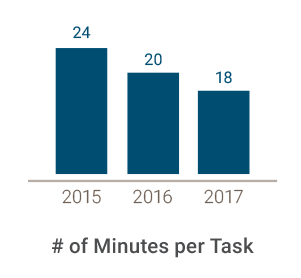Brookwood Baptist Improves Patient Access Operations and Collections
About
Brookwood Baptist Medical Center (Brookwood) is part of a health system with 1,700 licensed beds and approximately 1,500 affiliated physicians that aims to attract new patients to its network with a top-notch patient experience that includes increased transparency into patients’ financial obligations. Brookwood serves the Birmingham-Hoover metro area of central Alabama with a total population of 1.14 million residents.
Challenge
Self-pay collections were steadily increasing as a percentage of Brookwood’s net patient revenue. Like many providers, Brookwood had a myriad applications that patient access staff leveraged to provide patients their payment estimates and the results were not always 100 percent accurate. Additionally, if patient volume was up, staff would skip processes. This led to denials, disputes, bad debt expenses and other revenue collection issues. With no standardized workflow, there was little to no visibility into patient access functions and managers were unable to make constructive changes to the patient payment experience.
Solution
Brookwood partnered with Conifer Health Solutions to implement ConiferCore® Patient Intelligence across all of its patient access locations. This tool integrates more than a dozen disparate applications into a single dashboard and its standardized workflows help managers more effectively train their team and quickly identify and resolve issues.
Positioning frontline patient access teams with tools to improve performance and the patient experience


Brookwood Leveraged Technology, Analytics and Governance to Transform Patient Access and Secure Revenue
This health system optimized the patient payment experience to deliver measurable value to the organization and the community it serves.
Leveraged Technology and Intelligence
Consolidated multiple bolt-on systems and created an optimal combination of people, processes and technology through an innovative intelligence tool.
Enhanced Staff Training and Development
Increased focus on exceptional service and education and created specific engagement models for staff adoption to illustrate the processes enhanced through automation.
Automated Workflows and Operations
Automated patient advocacy steps (i.e., estimating the appropriate time and method to request payments from patients), automated manual work efforts and standardized critical steps in the registration process.
Transformed Patient Access Functions
Improved delivery of patient services, payment processing and collections, integrating the entire patient experience process into one single workflow.
Williams says this is in large part due to increased accountability and visibility. Managers run daily reports that show where documentation tasks were left uncompleted. Also, the patient access team can discover when payments are denied or disputed to see where the breakdown happened during the registration and financial clearance process. “We are able to look at 12,000 accounts a month. If we didn’t have the platform in place, it would be harder to manage that volume and to identify root causes of denials and disputes,” Williams says. Brookwood soon hopes to have a scorecard for employees to increase transparency about their individual performance.
Results
With the new ConiferCore® Patient Intelligence platform and workflow, Brookwood remains competitive in its region and has been able to attract new patients. Brookwood chief financial officer Brandon Williams says Brookwood is receiving higher industry scores for patient satisfaction, which can be attributed in part to its improved patient access operations.
Paying attention to patient access has also garnered Brookwood a significant return on investment. On a monthly average, Brookwood is experiencing an increase of 6.9 percent in point-of-service collections and a 10.3 percent decrease in patient access denials (pre- vs. post-deployment of the platform).
On a monthly average, Brookwood is experiencing a:
6.9%
Increase
in point-of-service collections
10.3%
Decrease
in patient access denials